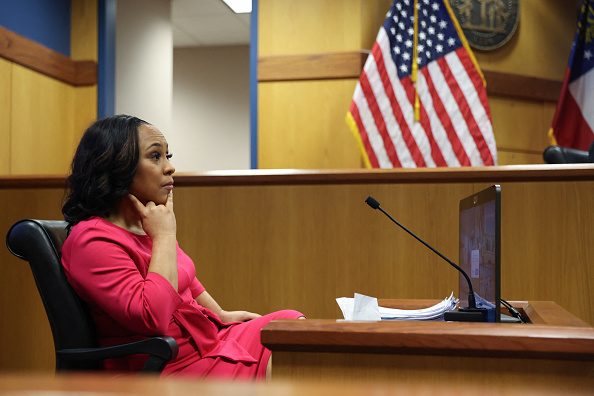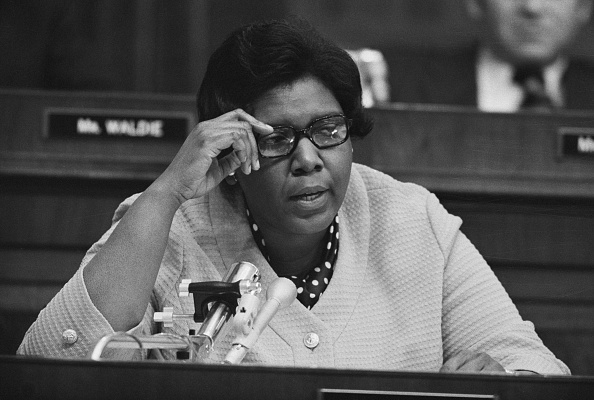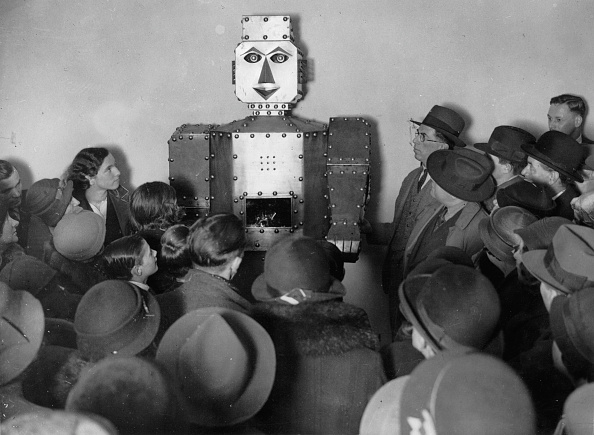What Black Women are Risking for American Democracy

What do Fani Willis, Letitia James, and Tanya Chutkan have in common?
Each of these Black female attorneys is holding Donald Trump accountable in legal cases that may determine whether he can retake the White House. From their different positions in the judiciary, they are defending the rule of law—and protecting American democracy. These Black women are poised to make an indelible mark on U.S. history. But at what cost?
Despite their institutional power—and prestigious educations and hard-earned credentials, these women now face a palpable vitriol, one uniquely reserved for Black women. What can the Trump-led campaign to discredit these women tell us about this political moment and the risks of safeguarding democracy?
Misogynoir and Dehumanization
These three women confront the challenge of an age-old strategy used to cast aspersions on Black women who refuse to bend to the myth of White supremacy. The accusation at the center of this tactic hinges on their unchangeable identity as Black and woman.
This double minority status is best understood by the term misogynoir. Combining “misogyny” with the French word “noir” (Black), Professor Moya Bailey of Northwestern University coined the term in 2010, explaining that “[T]he real root of misogynoir is how people perceive and treat Black women and understand them to be worthy of respect and care.”
American society requires near perfection from Black women because they are perceived to have two handicaps—not just one. This expectation means that Black women have to manage how they are viewed—because perception dictates what is possible.
But Black women are often seen as unworthy of protection and impossible to respect. When they are seen to be unwilling to uphold White Supremacist notions of inherited inferiority, vicious attacks about their competence, temperament, and moral choices ensue. This is the unvarying formula used to discredit Black women and undermine their authority.
This pattern is rooted in history. One must start with the dehumanization of enslaved Africans. European nations cemented the idea of White superiority when they scattered enslaved Africans across the globe. When they arrived on the shores of the Americas, they encountered patriarchal, racialized, sexualized societies. This is explored in Ibram X. Kendi’s work, Stamped From The Beginning: The Definitive History of Racist Ideas in America (adapted into a Netflix documentary last year). Kendi demonstrates how the construction of race, its spread with the Trans-Atlantic slave trade, and the dehumanization of Black bodies and of women, in particular, have threads that remain woven into the American societal tapestry.
As products of this legacy, the Black female judges and prosecutors who have their ability to hold Donald Trump accountable bring into question who is worthy of having power and who is not. This is not a knew observation. Already in the early 1970s, Micheal Parenti’s Democracy for the Few critiqued class and power within traditional political institutions. His provocative view of capitalism, the American political system, and our political economy helps the reader understand how contemporary social paradigms were built around the presumption of White male competence, while simultaneously asking others to prove such competence in a meritorious manner. This inequity exists today and has been highlighted by character attacks on these three Black women.
Judge Chutkan, State Attorney James, and District Attorney Willis’ authority and competence have been openly challenged by Trump, his defense team, and his followers. These character attacks are rooted in the idea that none of these women belongs in these places of power.
Attacks on the Competence of Black Women
Tanya Chutkan is the federal judge presiding over the the 2020 presidential election certification case, where Trump faces four federal criminal charges. A former public defender and civil litigator of Jamaican heritage, she did her undergraduate at George Washington University and law school at the University of Pennsylvania. Judge Chutkan was appointed to the DC federal court in 2014 by the Obama administration.
Last fall she placed Donald Trump under a gag order. This infuriated Trump, and his team went on the attack against Chutkan, requesting that she recuse herself from overseeing the case. They have asserted that her views on the January 6, 2021 attack on the Capitol show a bias against their client. Their claim boils down to the accusation that she is incapable of separating her personal feelings from the facts of a case and that she is unable to safeguard proper judicial procedure. In short, they argue Chutkan is incapable of doing her job. Casting aspersions, insinuations about ability, and attempting to remove Black women as authority figures are the primary tools used to deny Black women’s competence and agency.
In the case of Attorney General Letitia James in New York, her office filed against The Trump Organization in January 2022 for overstating the value of land donations made in New York to justify several million dollars in tax deductions. Insinuations of incompetence and rabid attacks from Trump and his sycophants immediately followed. As did the threats.
James was harassed online, by mail, and in person by supporters of Trump. No small part of their ire was rooted in the fact that she is the first Black woman Attorney General for NY—and a graduate of the Howard University Law School. A native of Brooklyn and graduate of Lehman College, she is known to be connected to her community and received her start in politics by serving on the city council. She won election as a public advocate in 2017.
Trump also sued James, accusing her of conducting a “war of intimidation and harassment” against him. The irony here is quite astounding: a man who has used his family’s wealth to intimidate most of his life claims a Black woman, with power he objects to, is intimidating him. Once the threat of a lawsuit wasn’t enough to make the AG drop the case, more insinuations of incompetence brewed: Trump’s people criticized her handling of a sexual harassment complaint about her own chief of staff, a charge intended to cast doubt about not just her competence, but her ethics as well.
Yet the key point here is that Trump’s intimidation claim strikes at the heart of how Black women are perceived. They are seen as volatile, hostile, and unworthy of protection. Trump’s countersuit supports this idea, while sending the signal that his privilege as a White male makes it impossible for him to be reprimanded by a Black woman.
Morality and the Sexualization of Black Women
The case of Fani Willis is also revealing. A graduate of Howard University and Emory University Law School, in November 2020, she became the first Black woman to win election to the office of district attorney in Fulton County. Soon after taking office, Willis opened an investigation into Donald Trump’s interference in the 2020 election in Georgia. The investigation resulted in indictments for Trump and 18 others on 41 charges in August 2023.
Throughout the grand jury trial and after the announcement of the charges, Willis received hate mail—a tactic harassers use to make you feel unsafe in a place of comfort, your home. It is a form of intimidation with the goal of surrender. News outlets reported that the hate mail she received used racial slurs and demeaning language concerning her gender.
Trump joined alongside the anonymous attackers online by using the word “riggers”, a thinly veiled play on the N-word. This was followed by motions requesting a hearing date after the November 2024 election, which were denied. This harassment caused Willis to move several times, which the public learned of in a hearing on February 15, 2024.
Trump and his backers then turned to respectability politics. At the start of 2024, Fani Willis was facing allegations of an improper personal relationship. Michael Roman, a former Trump campaign official, sought the disqualification of the entire DA office tasked with prosecuting the election case. The initial accusation was that Willis financially benefitted from the hire of a special prosecutor. Allegedly, she hired this special prosecutor, who she was in a romantic relationship with, in exchange for cash payments. The nature of the allegations follows the tried and true method of casting aspersion on a Black woman by demanding moral purity.
This strategy of placing a spotlight on the sexual morality of a Black woman was on display in the hearing concerning Willis’ disqualification. Trump’s legal team questioned Willis about the nature of her relationship with Special Prosecutor Nathan Wade. The tone and tenor of many of the questions seemed to emasculate Wade, while portraying Willis as a power-hungry woman incapable of keeping her sexuality in check.
This line of questioning was pure misogynoir. Portraying her in a dominant role over Wade rang out like a dog-whistle to men who don’t believe women should have authority over men. At the same time, the questioning presented the Black woman Jezebel trope that reduces Willis to no more than her curvaceous body.
The unmitigated gaul of a former Trump campaign official to request disqualification on moral grounds is plain to see. Yet this move also shows how inequitable standards, especially in regard to personal relationships, can be weaponized against Black women like Willis. Trump is a known philanderer who has sexually harassed and assaulted women; filed bankruptcy to avoid paying debts to small businesses; and has paid out large undisclosed settlements for civil law suits.
The idea that an entire team of predominantly Black lawyers, led by a Black woman, should be disqualified due to perceived impropriety, proves the African American proverb, “You must be twice best to have half as much.” Even more detrimental is the critique from many in the Black community. Writing in The Root, Wayne Washington unconvincingly asserted that “Fani Wills and Nathan Wade Violated a Black American Rule.” His ultimate thesis: these two Black people should have known better because of the African American proverb, with emphasis on Willis as the female history-making district attorney.
Black Women’s Commitment to Democracy
New York State Attorney Letitia James was successful in the civil case against the Trump Organization. He was fined more than $350 million; and he and his eldest sons are banned from doing business in New York for the next three years. “Now,” James explained, “Donald Trump is finally facing accountability for his lying, cheating and staggering fraud. Because no matter how big, rich or powerful you think you are, no one is above the law.” This statement is the cornerstone for each of these three Black women and other Black women who have used their agency in protection of democracy at key moments in U.S. history.
The last time American democracy was under threat by the executive branch, a Black woman bold enough to be the first used her agency to speak up. In 1972, Barbara Charline Jordan became the first African American woman to be elected to Congress from the South since 1898. This was after the landmark Civil Rights Act of 1965, which resulted in the creation of a minority-majority district in Houston, Texas.

Jordan served three terms on the House Judiciary Committee, becoming a senior member and prominent voice. Her voice was notable during the impeachment process against President Richard Nixon. During the committee hearing, Jordan’s opening remarks displayed her commitment to the Constitution and the rule of law. The use of her voice alongside others resulted in Nixon’s resignation before impeachment.
Today, the manufactured spectacle of the election case in Georgia—and the around-the-clock media coverage—are part of a strategy to have the case against Trump and 18 others thrown out. If this distraction succeeds, it will potentially spare the leading Republican presidential nominee from facing conviction and prison time for an assault on American democracy, all before voters go to the polls in November. The spectacle, by its nature, is designed to question Blacks’ ability to be upright citizens, while dog whistling to the larger society about the unworthiness of these Black women and their ability to use their own agency.
Black women are expected to clear a high societal bar being conscious enough to understand their actions have consequences for an entire group of people. This, of course, is not the expectation of Trump or those of his ilk. This dichotomy, grounded in misogynoir, reflects the dire state of respect and care for Black women in this society. This unreasonable societal expectation of Black women is woven into the American tapestry. Misogynoir is as American as apple pie.
Fani Willis, Letitia James, and Tanya Chutkan are each tied to high profile cases that seek to protect American democracy. But at what cost? In the case of Barbara Jordan, it caused early death in 1996 at 59 years old.
With this as an historical back drop, Black women must ask themselves: what will be the continued cost? And the larger society must ask the question: how much longer will we ask Black women for their physical, mental, and emotional labor to keep safe a democracy the majority professes to love?



